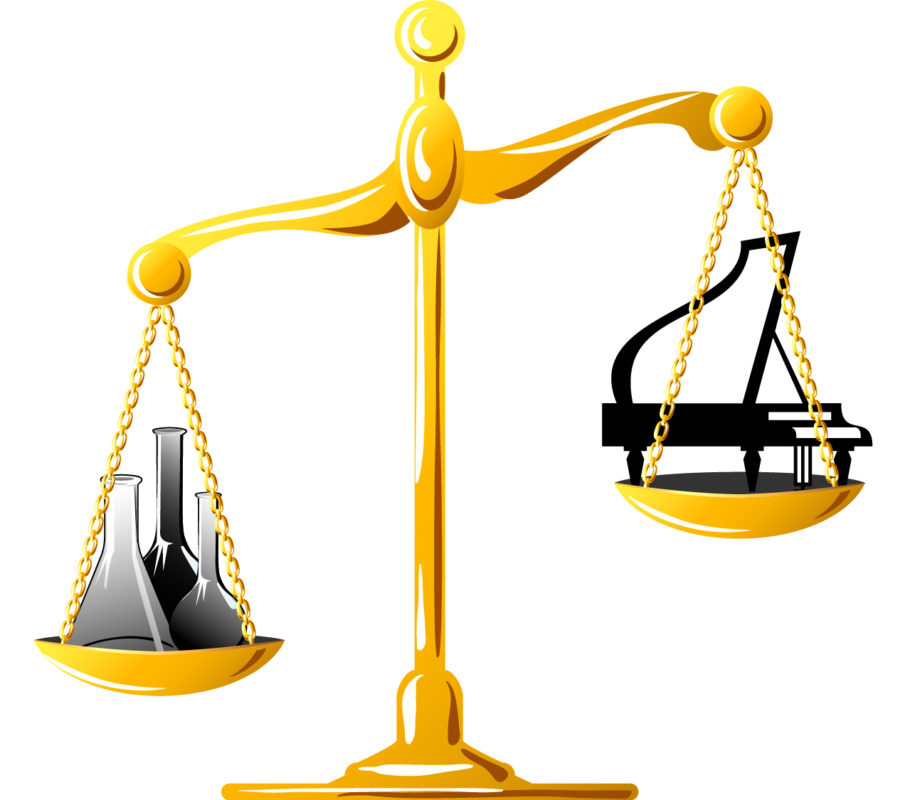Amollo: American education cannot rely on math, science alone
Graphic: Kelsey Kremer/Iowa State Daily
Too often, science and math outweigh music and the arts.
May 20, 2012
As the American education standards in comparison to the rest of the developed world continue to go downhill, a megaphone has been hoisted belching some noise to the effect that more attention needs to be devoted to math and sciences. And by that, they mean hard sciences.
To that effect, there is an interesting advertisement by Exxon Oil currently running on television with a lamentation that corporate America and other stakeholders could help rope in the magic necessary to increase scores among young learners. Currently, the United States is ranked 23rd among developed countries in scores in math and science among young learners.
There is an underlying assumption that all that is amiss with the dwindling education standards has everything to do with the decay in the teaching of math and sciences. There is also the strait-jacket conventional wisdom that the central pillar of a sound education is math and sciences. In other words, liberal education is secondary top education.
But what has math and science got to do with a progressive education system? Are we mourning the death of a promising scholarship or merely the decline in the ability of learners to memorize theories and numbers? Wouldn’t the basis of a strong educated society be the ability of people to engage one another in continual discourse? And, in-all-fairness, why aren’t we asking ourselves why we became so dependent as a people and how we could wean ourselves off of that dependence?
Without coming off as a wimp or a defender of liberal arts, I find the obsession with math and sciences a perilous path toward putting American education standards back on the lead. People who propose we pay close attention to the teaching of math and science are not giving reasons why and how the standards declined so fast over the years. Most of the industry leaders, including President Barack Obama, somehow believe that once we fix the problem with numbers and scientific theories, then we shall have found cure to our education problem.
Overemphasis in math and science is wrongheaded. I believe the problems with education largely stem from the society than from within a learning system or specific areas of instruction. The crisis that gripped the entire American society within its politics, economy and even morality has a spill-over effect that has engulfed a once sterling education system, the shining star that was the storied American education system — a global envy, was largely on the curiosity it imparts on learners. That the current generation of Americans lacks the oomph of scholarship and a curiosity thirsting for more knowledge details just how liberal grounding is the missing link.
What the American education system needs now than ever is a renewed commitment to the country’s history. A deeper emphasis in the liberal consciousness that dovetails this great country’s history and models of inquiry would catapult into droves of new breakthroughs to address the kind of deficit that we think only math and sciences would answer. Americans invented by questioning — citizens’ ability to engage, to test knowledge to share and to size up albeit without mischief their various levels of understanding.
This country has risen up to the occasion when reminded of its storied history. America rises up to occasion when confronted with the reality of her past. This country has a duty to subject young learners to the idea of America and what loyalty to her greatness can do. There’s a higher need to bring young Americans to understand that there once was an American where hard work was rewarded; Abraham Lincoln’s America saw civility pave the way for great invention. There is a higher need to instill in young citizens of America that when they sit in a classroom to learn, a whole country is relying on their pursuit of that knowledge. This is the message we have missed, and it is what will inspire rosy numbers in scores in those “coveted” areas in math and science.
It is pointless to insist that we invest in math and science among young learners when the media is awash with stories of capital greed, where individuals became richer overnight by cheating their way. If we can flip the pages backwards and arrive at a place in this country’s history where the moral chord was held sacrosanct, then that is what we must teach most Americans. It is the history, the American story of resilience and opportunity that inspires greatness.
It is the sense of this country’s liberal education that attached a greater sense to knowledge acquisition and the challenging that knowledge that pushed buttons of invention. It can be done again without the sectarian belief in the power of math and sciences.







